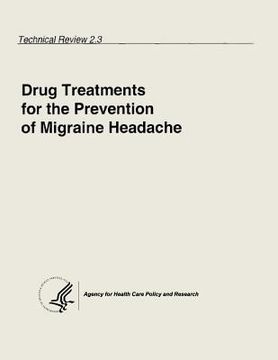Drug Treatments for the Prevention of Migraine Headache: Technical Review 2.3 (en Inglés)
Reseña del libro "Drug Treatments for the Prevention of Migraine Headache: Technical Review 2.3 (en Inglés)"
Migraine is a common and disabling health problem among adult Americans. Surveys from the U.S. and elsewhere suggest that 6% of men and 15% to 17% of women experience migraine headaches. These headaches result in significant disability and work loss; estimated aggregate indirect costs to employers in theU.S. for reduced productivity due to migraine range from $6.5 billion to $17 billion annually. Patterns of medical care for the treatment of migraine are highly variable. A substantial proportion of migraineurs never consult a physician about their headaches. Among those who do seek medical attention, many do not continue with the course of treatment prescribed by their physician, citing the availability of nonprescription medications and negative side effects associated with prescription medications among the reasons for self-treatment. Preventive drug treatments are used by a small percentage of migraineurs -- 3% to 5% of patients in various studies. It is not known whether the patients in these studies who were not using preventive drug therapy had never been offered such treatment or had tried it and found it ineffective or intolerable. A substantial body of high-quality evidence exists describing the effectiveness of various drugs for the prevention of migraine. Synthesis and dissemination of this information may help correct the underuse or misuse of preventive drug treatment strategies for migraine. The objective of this evidence report is to provide a comprehensive review and analysis of published reports of randomized controlled trials (RCTs) and other prospective, comparative clinical trials of drug treatments for the prevention of migraine. The present report does not cover all drugs that may be used for the prevention of migraine, but only those that have been studied in controlled trials among a population of migraineurs. These include (in alphabetical order): alpha-2 agonists (clonidine, guanfacine); anticonvulsants (divalproex sodium, sodium valproate, carbamazepine, clonazepam, gabapentin); antidepressants (amitriptyline, clomipramine, femoxetine, fluoxetine, fluvoxamine, mianserin, opipramol); beta-blockers (propranolol, metoprolol, acebutolol, alprenolol, atenolol, bisoprolol, nadolol, oxprenolol, pindolol, practolol, timolol); calcium antagonists (cyclandelate, flunarizine, nicardipine, nifedipine, nimodipine, verapamil); ergots (dihydroergotamine [DHE], dihydroergokryptine [DEK], ergotamine, and the combination agent Cafergot comp.(R)); methysergide; nonsteroidal anti-inflammatory drugs (NSAIDs) (aspirin, fenoprofen, flurbiprofen, indobufen, indomethacin, ketoprofen, lornoxicam, mefenamic acid, naproxen, naproxen sodium, tolfenamic acid); other serotoninergic drugs (pizotifen, lisuride, oxitriptan, iprazochrome, tropisetron); and other treatments (hormonal preparations [estradiol, mixed estradiol/progestogen oral contraceptives, flumedroxone] and the herbal remedy feverfew). Several drugs for which there is a large body of evidence are unavailable in the U.S., including flunarizine, pizotifen, and lisuride.

